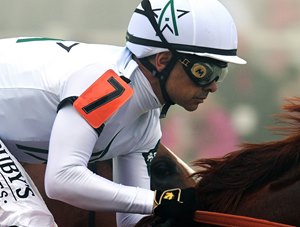CHRB Examines Interference Rules, Encouraged to do More


While comments from the California Horse Racing Board at its regular May 24 meeting didn't fully outline how concerns about recent stewards' interference calls (or non-calls) would be addressed, board member Madeline Auerbach assured the public that changes are coming.
Auerbach said the regulator plans to make changes to the rules on interference and how the stewards interpret those rules. The CHRB also plans to rotate stewards from track to track.
"Anyone in this room who doesn't think some changes are coming, they're not reading us accurately," Auerbach said. "We're going to get it done. You will see it shortly ... as soon as everything gets ironed out."
While a number of California stewards' decisions have received public scrutiny in recent years, a decision to leave Achira up after she reached the wire first under Mike Smith in a May 6 optional-claiming allowance race on the Santa Anita Park turf after coming out several lanes in the stretch brought the issue to a boil.
CHRB chairman Chuck Winner knows there's been a lot of concern about that particular call. He said the rule was evaluated during a May 23 meeting attended by himself, Auerbach, chief steward Darrel McHargue, staff members, and attorneys. Winner said they're working to reduce the amount of subjectivity required in the stewards' decisions, and they're looking at rotating stewards.
Horseplayer and new owner Leo Vukmanovich said California stewards' decisions are inconsistent.
"As a 40-year horseplayer, you have a good idea if a horse is going to come down or stay up," Vukmanovich said. "Now you have no idea what's going to happen."
To ensure objectivity among stewards, Vukmanovich suggested video be shown in black and white so that silks aren't readily identifiable. There might be technology available, he said, that help stewards determine whether interference occurred and who was affected, making it less of a judgment call.
"The way that we quantify if someone is cost a place needs to have some type of mechanism or two to measure that," Vukmanovich said. "It's just opinions (currently), and they're not consistent. I think that's what causes a problem."
Four days after the stewards' decision, Smith was suspended for failure to maintain a straight line in the stretch during the May 6 race. Vukmanovich said the decision frustrated horseplayers.
"The biggest insult to the players was a few days later, they give Mike Smith days," Vukmanovich said. "That acknowledges that he did something wrong, but he wasn't taken down."
CHRB chief steward Darrel McHargue said California has some of the top stewards in the country. He said they strive for consistency and objectivity.
"You do not let the personalities become involved in your decisions. It's just a matter of who fouled who, and you make your decision," McHargue said.
Winner backed McHargue's performance and noted the rules are different for taking a horse down and sanctioning a rider with a suspension.
"No one could do any better than Darrell McHargue. He's on top of this like nobody else can be," said Winner, who is open to ideas and suggestions for improving the process.
Thoroughbred owner Nick Alexander—noting he was speaking for himself and not on behalf of the Thoroughbred Owners of California, for which he serves as chairman—encouraged the board to do more than rule tweaks and steward rotations.
"You have to do something about it. Heads need to roll," Alexander said. "Somebody needs to be fired or replaced. You're costing Southern California a lot of money if you don't do something. ... You can't just let it happen again and again and again."
Tim Ritvo, COO of Santa Anita owner The Stronach Group, said it's important to hear the concerns of the betting public.
"I'm glad you're looking at this very seriously. And I'm glad customers have come up here to talk, because they're the economic engine of the sport. If they don't feel like they have a fair shot and are fairly represented, we're going to lose a lot of business," Ritvo said. "It's the most highly regulated environment there is, and we continue to see mistakes like this being made."
Ritvo suggested stewards be sanctioned for incorrect calls.
"When a horseman, a trainer, or jockey violate a rule, or make a mistake for trying—maybe a jockey trying too hard to win a race—they get suspended. The public sees it, and he's penalized and loses money," Ritvo said. "It needs to be some type of reprimand (for stewards)."
